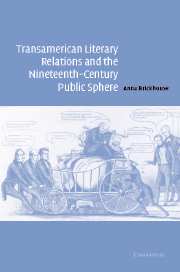Book contents
- Frontmatter
- Contents
- Acknowledgments
- Note on texts and translations
- Prologue
- 1 Introduction: transamerican renaissance
- 2 Scattered traditions: the transamerican genealogies of Jicoténcal
- 3 A francophone view of comparative American literature: Revue des Colonies and the translations of abolition
- 4 Cuban stories
- 5 Hawthorne's Mexican genealogies
- 6 Transamerican theatre: Pierre Faubert and L'Oncle Tom
- Epilogue
- Notes
- Index
3 - A francophone view of comparative American literature: Revue des Colonies and the translations of abolition
Published online by Cambridge University Press: 22 September 2009
- Frontmatter
- Contents
- Acknowledgments
- Note on texts and translations
- Prologue
- 1 Introduction: transamerican renaissance
- 2 Scattered traditions: the transamerican genealogies of Jicoténcal
- 3 A francophone view of comparative American literature: Revue des Colonies and the translations of abolition
- 4 Cuban stories
- 5 Hawthorne's Mexican genealogies
- 6 Transamerican theatre: Pierre Faubert and L'Oncle Tom
- Epilogue
- Notes
- Index
Summary
FRANCOPHOBIA AND ITS DISCONTENTS IN THE 1830S
This chapter turns from Jicoténcal and the contradictory logic of inter-American affiliation and cross-continental enthusiasm that characterized several competing public spheres of the 1820s to the next decade's consolidation of a largely southern, proslavery nativism directed specifically at the francophone West Indies. Yet the nativism of the 1830s had strong roots already in the previous decade: the anglophone ideal of New World solidarity emerging in the 1820s had never truly been hemispheric in the geographic sense of the word. Even at the height of its avowals of New World fellowship, of kinship “with every American, whatever language he may speak,” the Anglo-American vision of a united hemisphere of free, democratic nations failed to embrace the francophone Caribbean, all of it still firmly under French colonial rule – with the notorious exception, of course, of Haiti.
As the first nation of the Americas to legislate abolition, Haiti represented an obvious threat to the slaveholding economy of the United States. An independent state created out of the insurrection of slaves and free people of color, Haiti embodied as well a concrete range of terrors in the Anglo-American literary and political imagination directed at the francophone Caribbean more generally. Long before the 1830s, Jefferson had made the connection between the revolutions that produced Haiti and the ubiquitous possibility of slave revolt within the United States, observing that the “West Indies appears to have given considerable impulse to the minds of the slaves … in the United States.”
- Type
- Chapter
- Information
- Publisher: Cambridge University PressPrint publication year: 2004



